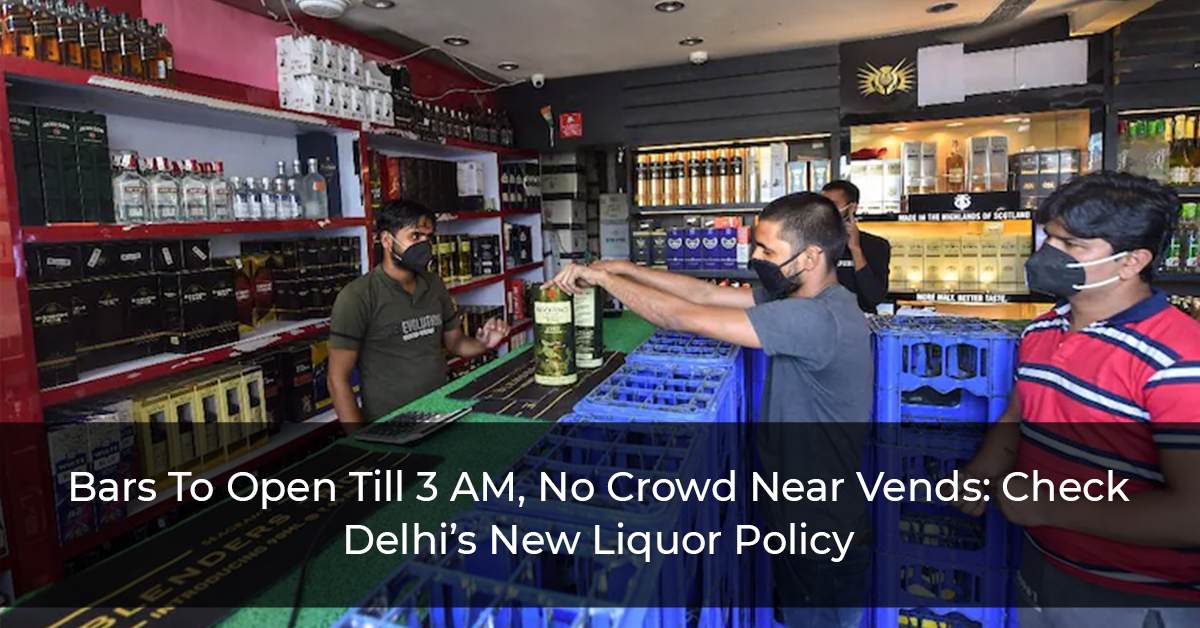Highlights:
- The new guideline also mandated that vends must be air-conditioned and well-lit.
- Vendors will be required to install CCTV cameras both inside and outside their stores.
- The licensee is responsible for ensuring proper security in and around each vend.
The Delhi government has unveiled its new Excise Policy 2021-22, which aims to give customers a walk-in experience at alcohol stores, promote microbreweries, and allow bars in hotels, clubs, and restaurants to stay open until 3 a.m., among other reforms aimed at increasing revenue and cracking down on the liquor mafia.
Delhi is the 28th most visited city in the world and the first in India, according to the Excise Policy 2021-22, which was released on Monday. Excise is a significant source of revenue for the state, according to the new Excise Policy 2021-22.
The policy document, on the other hand, ignores home delivery of liquor, which is covered by Excise Rules, as well as the proposed reduction of the legal drinking age from 25 to 21 years to bring it in parity with neighbouring cities.
The government will no longer be involved in the retail liquor trade under the new system, allowing state-run stores to close and private players to thrive in the nation’s capital.
Also Read: PM Modi To Address CoWIN Global Conclave Today As CoWIN App To Go Global
Walk-in experience
According to the city’s excise policy for 2021-22, every liquor outlet in the city will offer customers a walk-in experience with several brand options, and the full selection and sale process will take place within the vend premises.
No crowing outside liquor vends
As per the new policy, glass doors will be installed on air-conditioned retail vends. Customers will not be allowed to queue outside vends or on the pavement to buy through the counter.
Supply of draught beer to bars
Delhi residents will be able to fill their bottles or ‘growlers’ with freshly brewed beer from any microbrewery in the city under the new excise policy. Microbreweries can now supply draught beer to bars under the new policy.
“Draught beer in bottles or ‘growlers’ will be permitted to be taken away. Microbreweries will also be permitted to supply other pubs and restaurants with liquor licenses,” the policy document stated.
Bars to operate till 3 AM
Bars at hotels, restaurants, and clubs have been allowed to operate until 3 a.m. as part of the new rules, with the exception of those licensees who have been granted a license to provide round-the-clock liquor service. According to the new policy, such restaurants can offer alcohol in open areas such as terraces and balconies.
The city will have 849 retail liquor vends, including five super-premium retail vends with a minimum carpet space of 2,500 square feet.
Also Read: You Can Now Get Driving License Without Any RTO Test; All You Need To Know
Super Premium Vends
” Super Premium Vends, who will set up a tasting area on the premises, are only allowed to sell products that cost more than Rs 200 MRP for beer and more than Rs 1,000 MRP for all other spirits, such as Whiskey, Vodka, Brandy, Gin and so on.”
” Super Premium Vendors will be required to carry at least 50 foreign (B10) liquor brands, as well as wines (BECRS) and other brands, in their stores,” according to the policy document.
Special Excise Adhesive Labels
The Delhi government plans to use special excise adhesive labels, special inspection teams, and a state-of-the-art lab to combat tax fraud, retail vends, and spurious liquor.
The excise department has introduced Excise Adhesive Labels (EALs) with high-end security features manufactured by Security Printing and Minting Corporation of India Limited (SPMCIL) to prevent tax evasion and plug leakages in the supply chain, according to the policy, and has also signed an agreement with SPMCIL.
New licenses
On payment of a one-time annual fee, the Delhi government has issued a new license L-38 for banquet halls, party places, farmhouses, hotels, wedding/party/event venues that allows them to serve Indian and foreign liquor at all events hosted at their premises.
Previously, such establishments had to get a temporary license in the form of a P-10, P-10A, P-11, or P-13 in order to host parties and gatherings.


